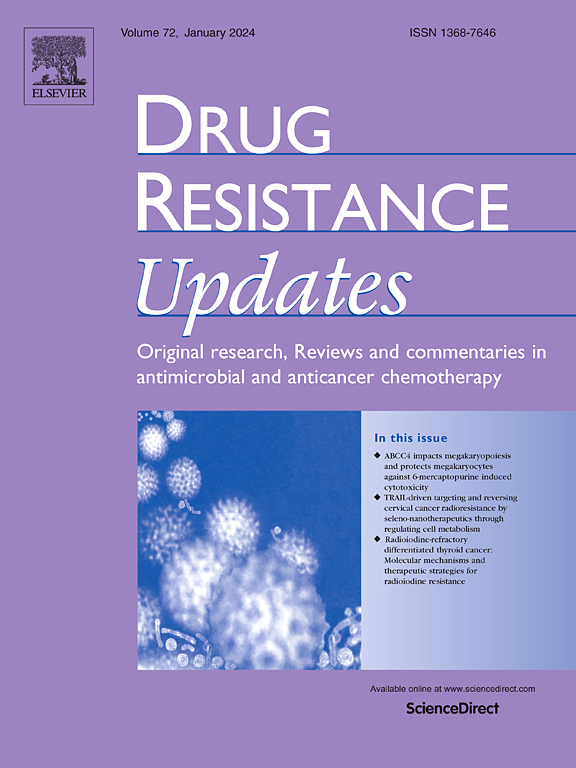抗药性中的翻译后修饰
IF 21.7
1区 医学
Q1 PHARMACOLOGY & PHARMACY
引用次数: 0
摘要
抗肿瘤药物、抗菌药物和抗病毒药物的抗药性严重限制了疾病的治疗效果和治愈率。以糖基化、泛素化、SUMOylation、乙酰化、磷酸化、棕榈酰化和乳酰化为代表的蛋白质翻译后修饰(PTM)与耐药性密切相关。PTM 通常是通过在氨基酸残基上添加糖链(糖基化)、小蛋白(泛素化)、脂质(棕榈酰化)或功能基团(乳化)来实现的。这些共价添加通常是信号级联的结果,可能是可逆的,触发机制取决于修饰的类型。PTMs 与抗肿瘤药物耐药性有关,不仅是耐药性的诱因,也是逆转耐药性的靶点。细菌表现出多种 PTMs 介导的抗菌药物耐药性。PTMs 使病毒蛋白质和宿主细胞蛋白质形成复杂的相互作用网络,诱导复杂的抗病毒药物耐药性。本综述总结了 PTMs 在耐药性中的重要作用,为探索耐药机制、开发新的药物靶点和指导治疗方案提供了新思路。本文章由计算机程序翻译,如有差异,请以英文原文为准。
Post-translational modifications in drug resistance
Resistance to antitumor drugs, antimicrobial drugs, and antiviral drugs severely limits treatment effectiveness and cure rate of diseases. Protein post-translational modifications (PTMs) represented by glycosylation, ubiquitination, SUMOylation, acetylation, phosphorylation, palmitoylation, and lactylation are closely related to drug resistance. PTMs are typically achieved by adding sugar chains (glycosylation), small proteins (ubiquitination), lipids (palmitoylation), or functional groups (lactylation) to amino acid residues. These covalent additions are usually the results of signaling cascades and could be reversible, with the triggering mechanisms depending on the type of modifications. PTMs are involved in antitumor drug resistance, not only as inducers of drug resistance but also as targets for reversing drug resistance. Bacteria exhibit multiple PTMs-mediated antimicrobial drug resistance. PTMs allow viral proteins and host cell proteins to form complex interaction networks, inducing complex antiviral drug resistance. This review summarizes the important roles of PTMs in drug resistance, providing new ideas for exploring drug resistance mechanisms, developing new drug targets, and guiding treatment plans.
求助全文
通过发布文献求助,成功后即可免费获取论文全文。
去求助
来源期刊

Drug Resistance Updates
医学-药学
CiteScore
26.20
自引率
11.90%
发文量
32
审稿时长
29 days
期刊介绍:
Drug Resistance Updates serves as a platform for publishing original research, commentary, and expert reviews on significant advancements in drug resistance related to infectious diseases and cancer. It encompasses diverse disciplines such as molecular biology, biochemistry, cell biology, pharmacology, microbiology, preclinical therapeutics, oncology, and clinical medicine. The journal addresses both basic research and clinical aspects of drug resistance, providing insights into novel drugs and strategies to overcome resistance. Original research articles are welcomed, and review articles are authored by leaders in the field by invitation.
Articles are written by leaders in the field, in response to an invitation from the Editors, and are peer-reviewed prior to publication. Articles are clear, readable, and up-to-date, suitable for a multidisciplinary readership and include schematic diagrams and other illustrations conveying the major points of the article. The goal is to highlight recent areas of growth and put them in perspective.
*Expert reviews in clinical and basic drug resistance research in oncology and infectious disease
*Describes emerging technologies and therapies, particularly those that overcome drug resistance
*Emphasises common themes in microbial and cancer research
 求助内容:
求助内容: 应助结果提醒方式:
应助结果提醒方式:


